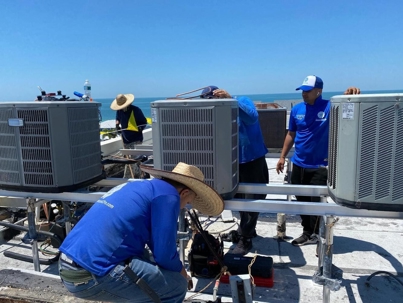Maintaining a multi-family residence can be challenging yet rewarding in the world of property management. One of the most critical aspects of this challenge lies in managing the Heating, Ventilation, and Air Conditioning (HVAC) systems that keep tenants comfortable year-round.
Multi-family HVAC Contractors in St. Petersburg play a pivotal role in ensuring these systems operate optimally, yet they often face unique challenges that differ significantly from single-family setups. This article provides:
- An in-depth look at HVAC maintenance strategies explicitly tailored for multi-family properties.
- Focusing on regular inspections.
- Energy efficiency.
- Communication with tenants.
- Troubleshooting common issues.
Insights from experts like Momentum AC & Electric, a trusted name in HVAC services, inform it.
Understanding the Unique Challenges of Multi-Family HVAC Contractors' Systems
Managing HVAC systems in multi-family properties presents a distinct set of challenges. Unlike single-family homes, where there is often a straightforward, individualized approach to heating and cooling, multi-family systems require a more complex infrastructure that caters to numerous occupants.
Overview of Multi-Family HVAC Systems
Multi-family HVAC Contractors’ systems can be centralized, serving multiple units, or decentralized, where each unit has its own system. Centralized systems, such as chilled water or geothermal setups, provide consistent climate control across many units but require significant oversight to ensure comfort levels meet the varying preferences of all tenants. Decentralized systems offer greater individual control but can lead to discrepancies in tenants’ energy use and maintenance responsibilities.
Common Challenges Faced by HVAC Contractors
- Shared Systems: With centralized HVAC systems, a failure or malfunction in one area can affect multiple units, making it essential for contractors to conduct regular maintenance and repairs promptly.
- Tenant Coordination: Coordinating maintenance in multi-tenant buildings can be complex. HVAC contractors must establish schedules that accommodate tenant availability while ensuring minimal disruption to daily life.
- Varying Usage Patterns: Each tenant may use the HVAC system differently, leading to diverse wear-and-tear patterns. Recognizing and addressing these variations is crucial for maintaining system longevity and effectiveness.
- High Demand During Seasons: Peak seasons, such as summer and winter, place immense pressure on HVAC systems. Every unit might demand heating or cooling almost simultaneously, increasing the likelihood of system stress and potential failures.
By recognizing these challenges, HVAC contractors can better prepare and implement tailored maintenance strategies to enhance overall efficiency.
Regular Inspection and Maintenance Schedule
Establishing a regular inspection and maintenance schedule is paramount for maintaining the efficiency and reliability of HVAC systems in multi-family properties.
Importance of Regular Inspections
Regular inspections serve to prevent unexpected breakdowns and maintain optimal performance. HVAC systems can develop issues over time due to dirt accumulation, wear on components, and environmental factors. Routine check-ups can catch these problems early, saving property managers from costly repairs.
Creating a Comprehensive Maintenance Schedule
Crafting a comprehensive maintenance schedule tailored to multi-family properties involves:
- Pre- and post-season (spring and fall)
- Monthly assessments for outdated or poorly functioning units
- Seasonal checks for debris around outdoor units
- Immediate response protocols for tenant-reported issues
Checklist of Essential Tasks During Inspections
A typical HVAC inspection should include the following tasks:
- Changing Air Filters: Change or clean filters every 1-3 months to ensure proper airflow and indoor air quality. Clogged filters restrict airflow, making the system work harder and increasing energy costs.
- Inspect Coils: Check evaporator and condenser coils for dirt build-up, which can hinder heat exchange and lower system efficiency. Cleaning coils should be part of the regular maintenance plan.
- Ductwork Assessment: Inspect ductwork for leaks or blockages to ensure efficient operation. Unsealed ducts can lead to significant energy loss and uneven heating or cooling across units.
- Checking Refrigerant Levels: Low refrigerant can indicate potential leaks, so checking levels should be routine. An HVAC technician can identify and repair leaks to prevent more significant problems.
- Monitoring Thermostats: Ensure the thermostats are properly functioning and calibrated for temperature accuracy. Malfunctioning thermostats can cause discomfort and inefficient system operation.
Implementing a well-structured maintenance schedule improves system performance and contributes to tenant satisfaction and retention.
Energy Efficiency and Cost-Saving Measures
Regular maintenance isn’t just about keeping the HVAC systems running; it’s also about ensuring they operate efficiently and cost-effectively.
Tips for Improving Energy Efficiency
- Upgrade to Energy-Efficient Components: Whenever possible, investing in energy-efficient HVAC units can significantly reduce energy consumption. Units with high SEER (Seasonal Energy Efficiency Ratio) ratings offer better efficiency at lower operating costs.
- Utilize Smart Thermostats: Installing smart thermostats enables better control of HVAC systems. These devices can learn residents’ preferences and adjust heating and cooling accordingly, optimizing energy usage and enhancing comfort.
- Implement Regular Energy Audits: Regular energy audits can help identify inefficiencies within the property. Adjustments based on audit findings can lead to significant energy savings.
- Educate Property Owners and Tenants on Energy-Saving Practices: Providing informational sessions about proper HVAC usage can empower tenants to take control of their energy consumption. Simple actions like sealing windows, using blinds to minimize heat loss or gain, and reporting maintenance issues promptly can have a substantial impact.
Recommendations for Upgrading to Energy-Efficient Components
When retrofitting or upgrading, HVAC contractors should focus on:
- High-Efficiency Air Conditioning Units: Investing in these systems diminishes energy costs and provides tenants with better comfort control.
- Sealing Windows and Improving Insulation: Upgrading windows and enhancing building insulation can reduce the overall demand for HVAC systems by minimizing heat transfer.
- Implementing Ductless Systems: Ductless mini-split systems allow for individualized temperature control in each apartment, contributing to comfort while reducing the overall load on the central system.
By prioritizing energy efficiency in HVAC maintenance, contractors can create a more sustainable and cost-effective living environment for multi-family residents.
Addressing Common HVAC Issues in Multi-Family Properties
Even with proper maintenance, issues can arise. Contractors must be prepared to handle common HVAC problems effectively.
Identify and Troubleshooting Common HVAC Issues
- Uneven Heating or Cooling is often the result of improper system sizing or issues with ductwork. Contractors should conduct assessments to identify problem areas and make necessary adjustments.
- Poor airflow: Restricted airflow can significantly impede HVAC efficiency. Check for dirty filters, blocked vents, and duct obstructions. Solutions include regularly changing filters, ensuring clear vents access vents, and cleaning ducts.
- Noise Complaints: Unusual sounds from the HVAC system can indicate mechanical issues. Causes could include loose components or dirt accumulation on fan blades. Addressing these issues promptly can prevent more significant problems.
- Humidity Issues: Excessive humidity can lead to concerns about comfort and promote mould growth. HVAC systems should be regularly calibrated and maintained to control indoor humidity levels effectively.
Best Practices for Quick and Effective Repairs
- Maintain a Responsive Maintenance Team: Promptly handling maintenance requests prevents prolonged disruption for tenants and enhances tenant satisfaction.
- Document Repairs and Follow-Up: After addressing an HVAC issue, contractors should follow up with tenants to ensure satisfaction and gather feedback for future improvements.
- Invest in Tools for Monitoring: Using innovative technology can allow contractors to monitor HVAC performance in real-time, quickly identifying issues before they become significant problems.
- Develop Strong Relationships with Tenants: Building rapport with residents encourages them to report issues early, enabling quicker resolutions and reducing repair costs.
These best practices enhance mechanical reliability and play a pivotal role in keeping residents satisfied and engaged.
Tenant Communication and Education
Effective communication is critical in managing tenant relations concerning HVAC maintenance.
Importance of Clear Communication with Tenants
Establishing open lines of communication promotes trust between property managers and residents. Tenants should feel informed about maintenance schedules, changes, and their responsibilities regarding HVAC systems.
Strategies for Educating Tenants
- Workshops and Informational Meetings: Organize events where tenants learn about energy-saving practices and proper HVAC use. Providing materials that they can reference later can reinforce this knowledge.
- Regular Updates: Use newsletters, emails, and notices to inform residents about upcoming maintenance, seasonal tips, and filter replacement reminders.
- Provide a Troubleshooting Guide: A simple guide outlining common HVAC issues and simple troubleshooting steps empowers tenants to address minor problems, such as adjusting thermostats or changing filters.
Handling Tenant Complaints and Concerns Effectively
- Acknowledge Complaints Promptly: When complaints arise, acknowledging them quickly demonstrates the manager’s commitment to tenant satisfaction.
- Communicate Next Steps: Clearly outlining the process for addressing HVAC issues helps set proper expectations.
- Encouraging Feedback: Soliciting feedback from tenants about their comfort and system performance allows property managers to make improvements based on direct input.
Implementing effective communication strategies is essential for fostering good relationships with tenants, which can lead to increased satisfaction and lease renewals.
Conclusion
HVAC maintenanceis critical to managing multi-family properties, directly impacting tenant comfort, safety, and satisfaction. HVAC contractors can ensure optimal system function by understanding multi-family systems’ unique challenges, establishing comprehensive maintenance schedules, and proactively addressing common issues.
They can also empower tenants to maintain their living environment through active communication and education.
For property managers and HVAC contractors seeking to enhance their maintenance practices, implementing these key strategies will prolong the lifespan of HVAC systems and foster tenant loyalty and satisfaction.
FAQs
- What is the recommended maintenance frequency for HVAC systems in multi-family properties?
Most experts recommend scheduling HVAC maintenance at least twice a year, ideally once in spring before the cooling season and once in fall before the heating season. This frequency allows contractors to prepare systems for peak usage, ensuring optimal performance and efficiency.
- How can HVAC contractors improve energy efficiency in older multi-family buildings?
Contractors can improve energy efficiency in older buildings by conducting energy audits to identify inefficiencies, installing energy-efficient units, upgrading insulation, and sealing drafts around windows and doors. Retrofitting systems, such as adding smart thermostats, can also optimize performance.
- What are the signs that an HVAC system in a multi-family property needs repair?
Common indicators that HVAC systems need repair include:
- Unusual noises (like banging or grinding).
- Reduced airflow.
- Inconsistent temperature regulation.
- Increased energy bills without increased usage.
- Frequent system cycling.
Tenants should be encouraged to report these signs immediately.
- How do HVAC contractors manage maintenance in buildings with multiple tenants?
Contractors typically create a maintenance schedule that minimizes disruption and ensures timely inspections. Effective communication with tenants regarding scheduled visits and responsiveness to reported issues helps maintain maintenance tasks efficiently.
- What should tenants do if they experience HVAC issues between scheduled maintenance visits?
Tenants should first check simple factors, such as ensuring the thermostat is functioning and that filters are clean. If issues persist, they should contact their property manager promptly to report the problem, ensuring it can be addressed before worsening.

